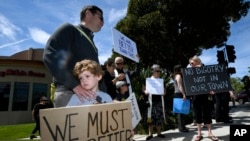Hate crime in America's five largest cities rose sharply in 2019, with New York, Los Angeles and Chicago all setting highs not seen since the terror attacks of Sept. 11, 2001, according to a new report from California State University.
The Jewish community was the most frequent target of hate crimes amid a resurgence in anti-Semitism, according to the report by the Center for the Study of Hate and Extremism. In the wake of at least five anti-Semitic attacks in New York during the Jewish festival of Hanukkah this week, Mayor Bill de Blasio announced Monday that police will increase patrols in several neighborhoods with large Jewish communities. "Hate doesn't have a home in our city," de Blasio tweeted.
Among the nation's five largest cities:
* New York City will show an estimated 415 hate crimes for the year, up from 361 in 2018 and the highest level since 2001. Anti-Semitism incidents jumped more than 20%, to 213, accounting for more than half of all bias-motivated attacks.
* Los Angeles will show 309 hate crimes, up from 290 in 2018 and also the highest since the Sept. 11 attacks. Anti-Jewish incidents more than doubled, to 58, while attacks targeting blacks jumped more than 18%, to 58.
* Chicago will show an estimated 96 hate crime incidents, up from 77 in 2018, and a post-9/11 high for the nation's third-largest city. Anti-Jewish hate crimes rose more than 46% over the previous year to a total of 19 incidents.
* Phoenix will show a 25% increase in hate crimes over the previous year.
* Houston, however, will show a decline in hate crime incidents of 25 percent.
Collectively, hate crimes in the five biggest cities rose from 867 in 2018 to 988 in 2019, about a 14% increase, according to the report. For the nation's 10 largest cities, however, the overall increase was slightly more moderate, at about 10%.
The overall surge in hate crime comes at a time of demographic change and hyperpolarized politics in America, and follows a slight decline in bias incidents in 2018.
"These data reflect several trends, including an escalating tribalism, where various prejudices like anti-Semitism, xenophobia and homophobia, among others, are widely shared across a diverse grouping of people," Brian Levin, the report's lead author, said. "Next, local demographic changes in densely populated cities means more people are coming into contact with each other right at a time when fearful stereotypes are increasingly become the kindling for violent behavior."
This past year has also been the worst for hate crime homicides since 1992, partly due to a white supremacist massacre of Hispanic shoppers at a Walmart store in El Paso, Texas. In what was described as the deadliest attack on Latinos in modern American history, 21-year-old Patrick Crusius killed 22 people and injured 24 others in August. That made Latinos the top target for extremist killings in 2019, according to the report.
In 2018, when 22 people were killed in hate crime incidents, Jews and African Americans were the top target. Of the 45 extremist-motivated homicides in 2019, 26 were committed by white supremacists, according to the report.




